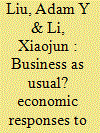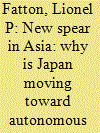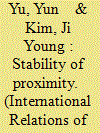|
|
|
Sort Order |
|
|
|
Items / Page
|
|
|
|
|
|
|
| Srl | Item |
| 1 |
ID:
165981


|
|
|
|
|
| Summary/Abstract |
What is the relationship between political tensions and economic relations? In this study, we explore this question by examining how Japan’s nationalization of the Diaoyu/Senkaku Islands, a territory much disputed with China, has affected bilateral trade between the world’s second and third largest economies. Using monthly data, we find that the nationalization imbroglio has negatively affected the amount of goods Japan exports to China, with the effect being most pronounced for highly salient and visible products such as automobiles and cameras; these experienced immediate and dramatic drops lasting up to 12 months. In contrast, raw materials and intermediate goods were not affected at all; some even experienced increased exports. These findings suggest that consumer and corporate responses to political tensions may follow different logics. For consumers, certain political tensions, especially those involving enduring territorial disputes, could override entrenched economic interests and preferences, at least in the short term. In these instances, it will no longer be business as usual.
|
|
|
|
|
|
|
|
|
|
|
|
|
|
|
|
| 2 |
ID:
165982


|
|
|
|
|
| Summary/Abstract |
Why did American-led postwar institution building lead to different types of security orders in Asia and Europe? The article investigates the failure of the Southeast Asia Treaty Organization (SEATO)—the only postwar multilateral security organization in the Asia-Pacific region that resembled NATO—as contrasted with NATO’s survival. Despite the popular notion of ‘American liberal hegemony’, the US-led multilateral security institution in fact faced serious resistance in Southeast Asia during the early years of the Cold War, as regional players viewed SEATO as yet another form of Western imperialism threatening their independence. The article makes a theoretical argument for the role of delegitimation in hegemonic order formation and shows that the Asian historical experience of Western colonialism had structural consequences for American-led hegemonic order building in Asia. China-India joint delegitimation strategies against the United States invoked local actors’ collective beliefs against colonialism portraying SEATO as a vehicle of Western domination. Once established, the United States’ European allies within SEATO placed constraints on the exercise of American hegemonic power, by taking advantage of the multilateral rules of SEATO and refusing to act collectively in the local crises in Laos. Archival evidence suggests that such delegitimation and restraint strategies were fairly successful in terms of limiting SEATO membership and blocking interventions in Indochina, strengthening Asian neutrality rather than creating a pro-US bloc in the region.
|
|
|
|
|
|
|
|
|
|
|
|
|
|
|
|
| 3 |
ID:
165984


|
|
|
|
|
| Summary/Abstract |
Japan is on the verge of what would be a dramatic shift in defense posture. The ‘spear and shield’ structure of the US–Japan alliance, at the center of its security policy for most of the postwar era, is being revamped by a move toward autonomous defense. Why would a country confined to a largely passive and Americanocentrist posture for more than half a century suddenly change course? I argue that autonomy is for Japan the only way out of an unprecedented ‘entrapment-abandonment dilemma’: any attempt to prevent defection by the United States in the face of an increasingly assertive China heightens to an unacceptable level the risk of Japan being dragged into a US-led conflict in the Korean Peninsula, and vice versa. Japan’s ability to wield the spear would likely have destabilizing consequences for the whole Asia-Pacific region.
|
|
|
|
|
|
|
|
|
|
|
|
|
|
|
|
| 4 |
ID:
165980


|
|
|
|
|
| Summary/Abstract |
Located geographically in the East, but often identified with the West, Japan’s role as a world power over the last century and a half remains curiously inconsistent in mainstream international relations (IR). By examining Japan’s often under-appreciated role in the international history of wealth and power, we argue that this tells us more about the distorting impact on IR theory of Eurocentrism and realism than it tells us about Japan’s role in world history. Symptomatic of these distortions are Japan's exclusion from or marginalization within, the first round of modernization before 1914, and the accompanying under-recognition of its role as a model and hub for Northeast Asia’s capitalist development. Also occluded is Japan’s key post-1945 role in both underpinning America’s superpower status, and promoting the capitalist world order in Asia. Mainstream IR theory provides poor foundations for both academic and policy analysis of Japan’s important world role.
|
|
|
|
|
|
|
|
|
|
|
|
|
|
|
|
| 5 |
ID:
165985


|
|
|
|
|
| Summary/Abstract |
The Senkaku/Diaoyu dispute, a territorial dispute between Japan and China, has long been regarded as a ticking bomb, capable of blowing up the already volatile Sino-Japanese relations at any time. Would the differences over the islands lead China and Japan into major military confrontations, if not all-out war? This article argues that there is cause for optimism and that the Sino-Japanese relationship has displayed a remarkable level of resiliency through the years. In examining the three major diplomatic crises of 2004, 2010, and 2012 (and beyond) surrounding the Senkaku/Diaoyu dispute, this article shows that Japan and China have successfully engaged in bilateral crisis management by operating political, diplomatic, and military exchanges to prevent further escalation. Our analysis calls for a more informed and balanced view within academic discourse, so as to encourage accurate threat perceptions between China and Japan, mitigate the security dilemma, thereby eventually fulfilling the optimistic theory.
|
|
|
|
|
|
|
|
|
|
|
|
|
|
|
|
| 6 |
ID:
165983


|
|
|
|
|
| Summary/Abstract |
This study investigates how territorial acquisition through war affects the durability of a successive ceasefire and determines what type of territorial acquisition is more detrimental to post-war peace. Despite the wealth of literature on recurrent war and on territory, the effect of territorial acquisition on war resumption has been understudied. This study shows that territorial acquisition creates expectations among adversaries for future power shifts, which results in a commitment problem that hinders peaceful revision of the existing ceasefire. Indeed, duration analysis of ceasefires following interstate wars since World War II shows that territorial change in war, especially acquisition of large and densely populated territories that have potential utility for greater power shifts, makes ceasefires more prone to failure. The analysis of Sino-Vietnamese ceasefires following militarized incidents over land and sea borders also illustrates the importance of territorial acquisition and the potential utility of the territory.
|
|
|
|
|
|
|
|
|
|
|
|
|
|
|
|
|
|
|
|
|